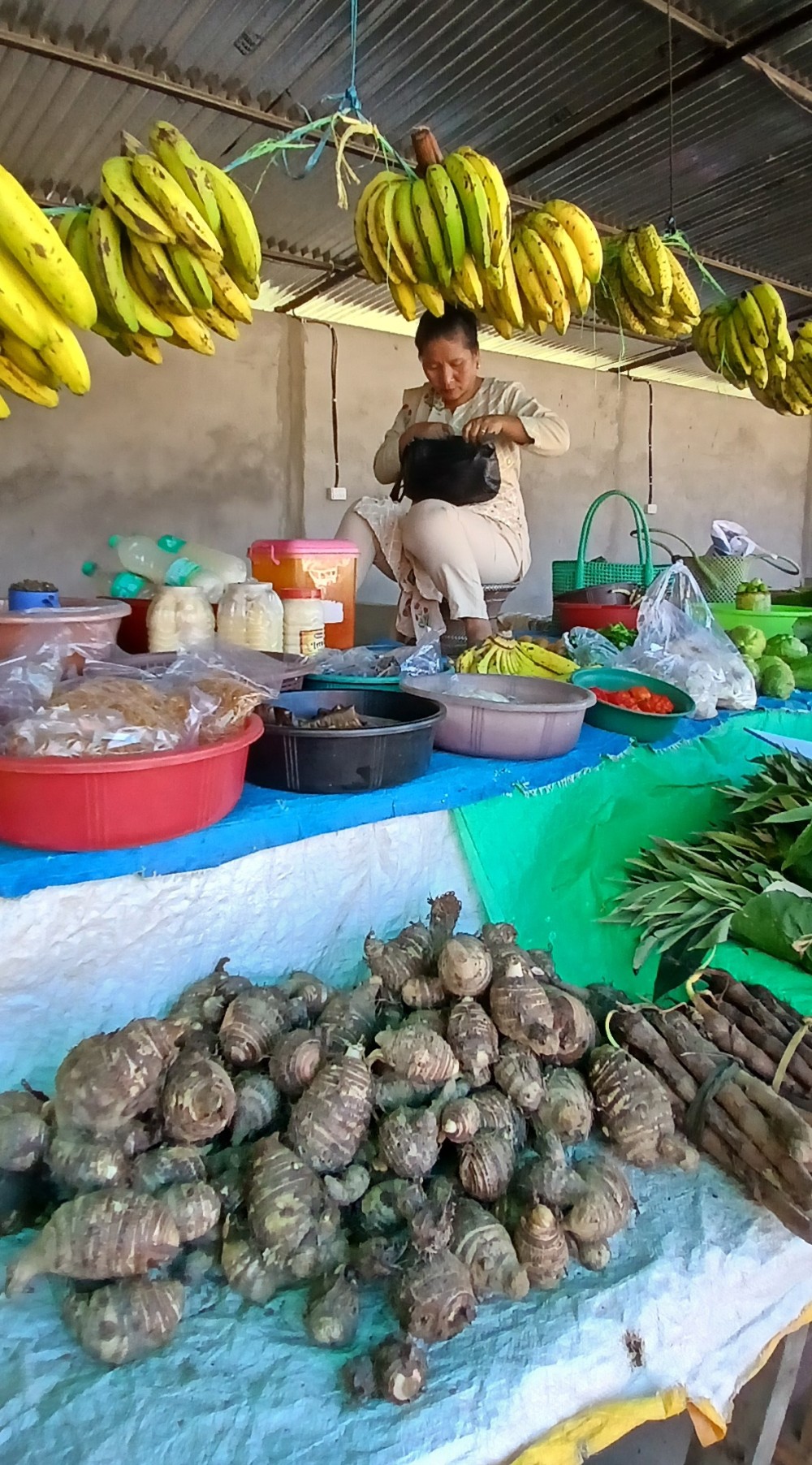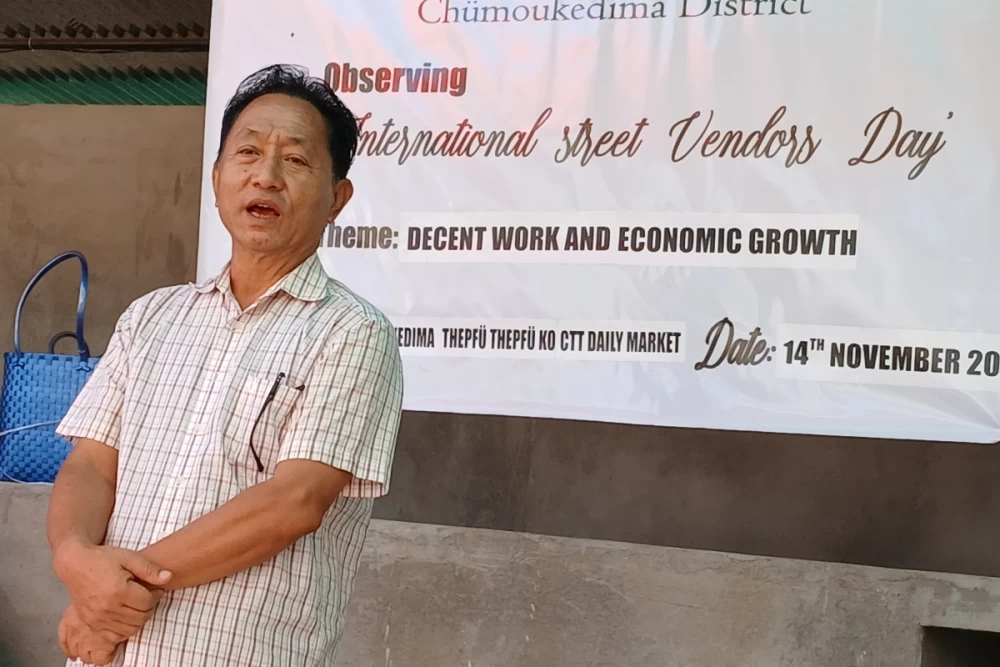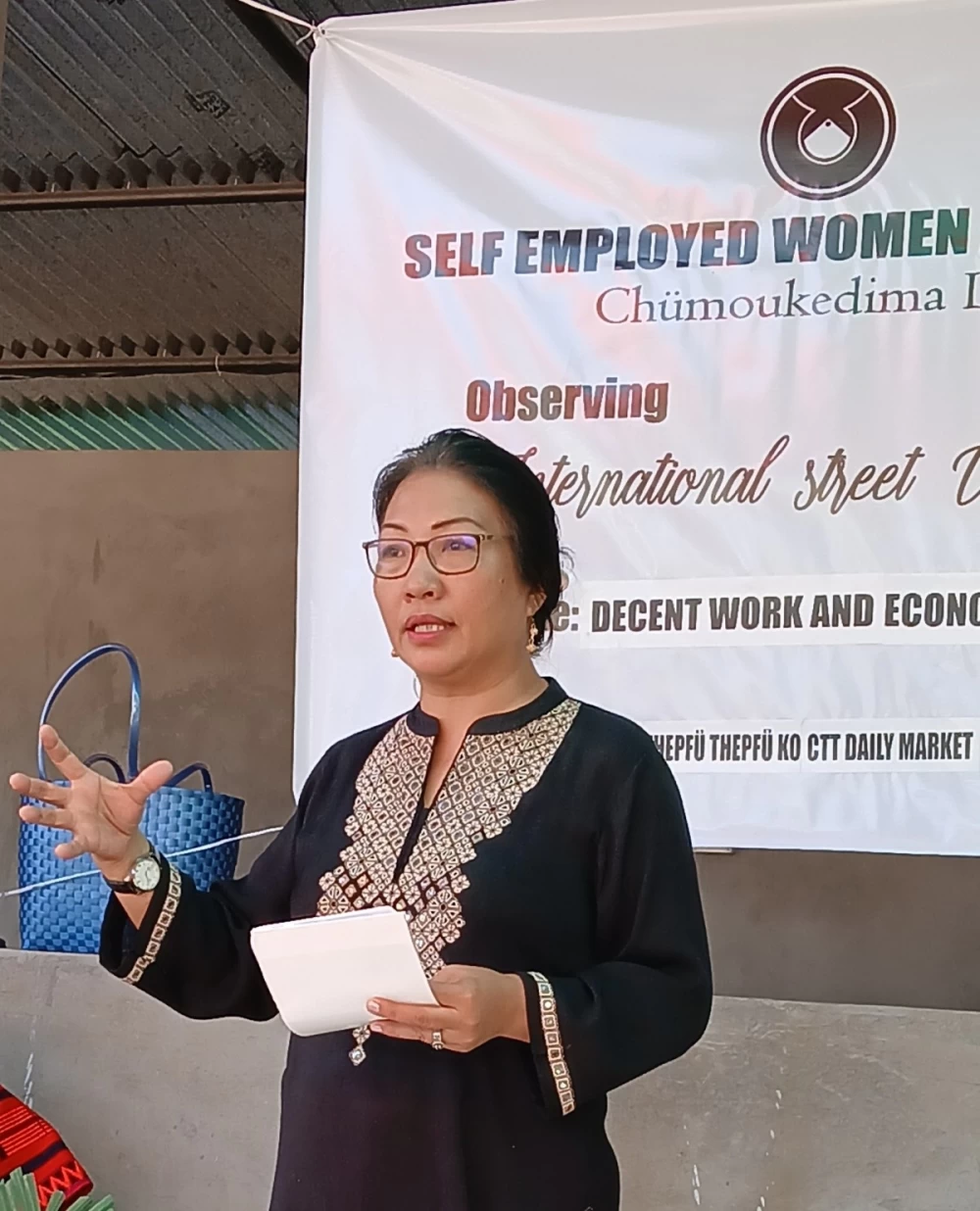A woman vendor at Thepfü Thepfü Ko Daily Market, Chümoukedima on November 14. (Morung Photo)

Akangjungla
Chümoukedima | November 14
Street vendors in Nagaland continue to grapple the impact of climate crisis and lack of proper policy to promote and safeguard their livelihood.
Kenile Kath, a vendor in Chümoukedima district, sharing her personal stories of struggles during the International Street Vendors Day 2024, highlighted the impact of climate change on her business. “Due to climate change we are now experiencing extremely hot weather, especially in Dimapur and Chümoukedima. For street vendors like us, we trade perishable items, mostly vegetables which easily and quickly get spoiled due to hot climate and we end up incurring huge loss,” Kath said.
While weather conditions are seasonal, Kath said, the long, soaring temperatures adversely affects their health. “Earlier we could sit comfortably for 7-8 hours but now most of us experience heat-related exhaustions,” she said. Kath observed that the drastic change in the climatic conditions and also use of harmful pesticides used in agriculture affects the productivity of crops, adding to their hardships.
Putting across the concerns to government authorities and agencies, Kath appealed for better facilities, including proper washrooms for women vendors and safe drinking water in vending spaces. She also suggested including women vendors in urban planning and other decision making bodies which deals with the welfare of street vendors.
Kath highlighted these issues as Self Employed Women’s Association (SEWA) in Chümoukedima marked its first International Street Vendors Day on the theme ‘Decent Work and Economic Growth’ at Thepfü Thepfü Ko Daily Market on November 14.
Atoli, a member of the Town Vending Committee (TVC), shared her experiences of the committee’s inactivity and the need for greater leadership and training for vendors. TVC is a government-mandated body under the Street Vendors (Protection of Livelihood and Regulation of Street Vending) Act, 2014.

Climate resilient street vending
Delivering keynote address, Renemsongla Ozukum, former General Secretary of SEWA Nagaland stressed the importance of aligning street vending policies with Sustainable Development Goals, particularly SDG 8 (Decent Work and Economic Growth).
She called for “climate justice” stating, ‘Decent Work and Economic Growth’ is about quality employment and reducing inequality; accessibility to clean, affordable and reliable energy; social security from any threats; and creating an enabling environment where good health and well being are promoted.
Ozukum encouraged the vendors to ‘adapt their products to seasonal demands and take a proactive approach to mitigating the effects of climate change.’ She advised the vendors to wisely consider ‘responsible consumption and production.’ “Plan and get the items which will save our eco resources,” she added.

Collaborative governance
‘The required actions and changes can be attained only when the vendors, who are the actual stakeholders, are consulted and their voices are heard,’ Ozukum maintained.
She said that most often the loopholes in development sector occur when the unheard, the unrecognised and the uncounted are overlooked. “Today, the Urban Municipal Bodies must not only listen but collaborate with the vendors to achieve their goals,” she opined.
Citing the example of Dimapur, “where we are navigating spaces due to internally displaced and rampant climate migrants,” Ozukum said, “It is not easy but with good governance and active participation with the authorities, we shall create a viable environment to build diverse and sustainable communities.”
Ozukum, who has been actively working with the street vendors since 2016, said International Street Vendors Day started globally on November 14, 2012. With the collaboration of North East Network, the SEWA initiated to engage with street vendors in Nagaland. “We have capacitated the women several times about their rights and responsibilities as street vendors. After several consultations and meetings with the national body, we could advocate towards Street Vending Act to be implemented in Nagaland. It was accepted in 2019,” she said.
However, expressing regret that after submitting recommendations for TVC formation in the district level, she said, “we are yet to hear or attend the meetings even if some of us have been nominated and informed us in hard copies.”
“Why we are still advocating for TVC implementation is because we care to collaborate to build sustainable cities and communities where economic growth flourish with decent work, dignity, healthy and a viable environment,” she concluded.
Earlier, the guest of honour, Lousito Khro, Chairman, Chümoukedima Town Council, acknowledged the unique challenges faced by street vendors in Nagaland, noting “street vending is primarily carried out by women.” He highlighted the lack of a stable and legal space for vendors to sell their goods and expressed his commitment to addressing these issues.
Ilibo Sema, SEWA Project In-Charge shared insights from recent research on the implementation of the Street Vendors Policy in Nagaland.
Call to action
As part of the event, SEWA representatives handed over a memorandum to the Chairman of Chümoukedima Town Council, Chümoukedima Chamber of Commerce, and the ADC of Chümoukedima. The memorandum outlined key demands to improve the livelihoods of street vendors: Activation of the Town Vending Committee (TVC): This includes capacity-building training for committee members in line with the Street Vendors (Protection of Livelihood and Regulation of Street Vending) Act, 2014; Establishment of a Grievance Redressal Committee: To address the issues and challenges faced by street vendors; Provision of Basic Amenities: Including access to free electricity, drinking water, dedicated women’s washrooms, and proper drainage facilities.






